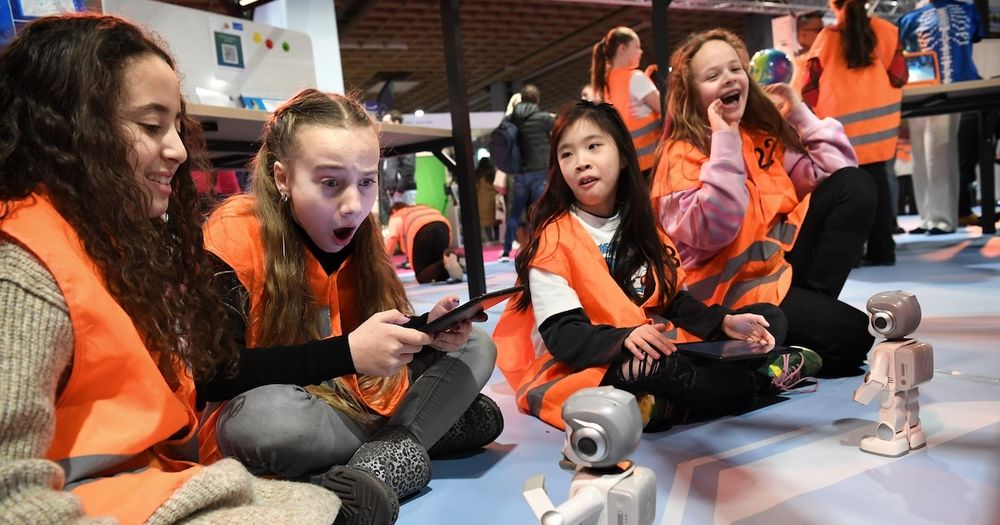
Het bedrog van het bestand: als het bombarderen stopt en een andere oorlog begint - The Rights Forum
Voor een rechtvaardig Midden-Oosten beleid
‘Het staakt-het-vuren is een politiek instrument om Gaza te doen vergeten’, schrijft Rita Baroud, een Palestijnse journalist uit Gaza. Ze leeft in ballingschap in Amsterdam en schrijft essays voor TRF. https://rightsforum.org/bedrog-van-bestand/
18.12.2025 06:00 — 👍 25 🔁 21 💬 0 📌 2
🧵1/
🚨 New article out!
How robust is the psychology of social class?
Together with Nicolas Sommet and @frederiqueautin.bsky.social, we conducted large-scale replications of 35 hypotheses across four countries.
Published in Nature Human Behaviour:
www.nature.com/articles/s41...
16.07.2025 13:10 — 👍 45 🔁 29 💬 2 📌 2

In the meantime, my other PhD student Keke Zhu got his first paper published. A strong start to this line of research on economic inequality among economically disadvantaged individuals. Co-supervised with @tkupp.bsky.social Read here: onlinelibrary.wiley.com/doi/10.1002/...
19.06.2025 10:11 — 👍 6 🔁 1 💬 0 📌 0
PhD Researcher - Scientific project on Education-based social identities
PhD Researcher - Scientific project on Education-based social identities
Only 10 days left to apply for this phd position on education-based identities, status, and political attitudes! Open to those interested in sociology, social psychology, political science, communication science or indeed a combination of all.
jobs.vub.be/job/Elsene-P...
13.06.2025 08:36 — 👍 14 🔁 18 💬 0 📌 0
bsky.app/profile/slde...
03.06.2025 18:11 — 👍 1 🔁 0 💬 1 📌 0
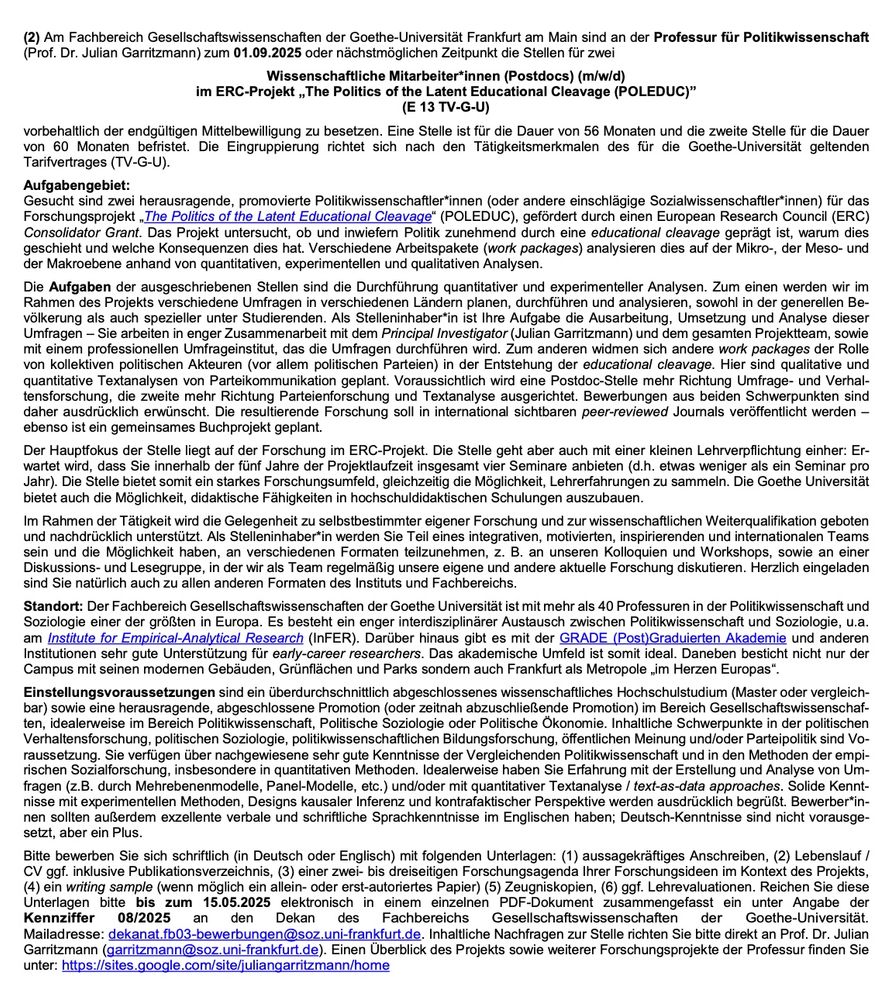
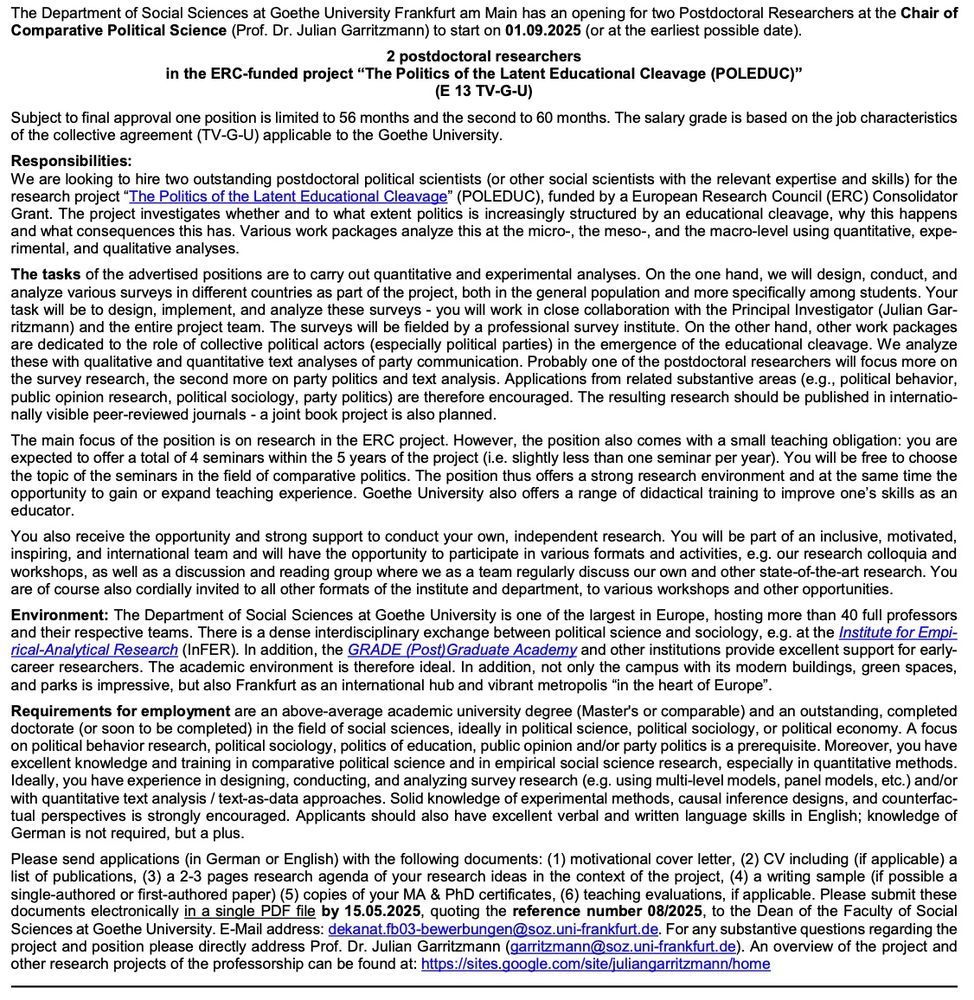
I AM HIRING 2 postdocs (5 years) in my @erc.europa.eu project "The Politics of the Latent Educational Cleavage" at @goetheuni.bsky.social @infer-frankfurt.bsky.social!
German call: www.fb03.uni-frankfurt.de/170856927.pdf
English call: www.goethe-university-frankfurt.de/170858269.pdf
Please share
17.04.2025 09:10 — 👍 101 🔁 118 💬 2 📌 9
Portail Emploi CNRS - Offre d'emploi - Thèse en psychologie sociale expérimentale (H/F)
📢 Thèse en psychologie sociale
Le LAPSCO (Université Clermont Auvergne / CNRS) recrute un·e doctorant·e à partir du 1er octobre 2025, dans le cadre du projet ANR IDEOPOL portant sur la polarisation idéologique.
📄 Détail de l’offre et candidature :
tinyurl.com/nzw896bf
Merci de partager !
28.05.2025 11:04 — 👍 4 🔁 7 💬 0 📌 0
America cannot long remain free, nor first among nations, if it becomes the kind of place where universities are dismantled because they don't align politically with the current head of the government.
23.05.2025 16:00 — 👍 48004 🔁 11333 💬 1461 📌 461

Postdoctoral researcher Sociology; Understanding climate change attitudes
What does climate change mean to people—and why? And how do these meanings shape public responses to policy and information campaigns?
📢 We're hiring a 4-year postdoc (0.8 FTE) at Erasmus Univ. Rotterdam for project on climate change meanings
Focus: Italian case (focus groups, survey, experiments)
PhD in Sociology (or related), fluent in Italian
🗓️ Deadline: June 11
#postdoc #sociology #academicjobs #Italy #climatechange
20.05.2025 16:10 — 👍 9 🔁 13 💬 0 📌 1
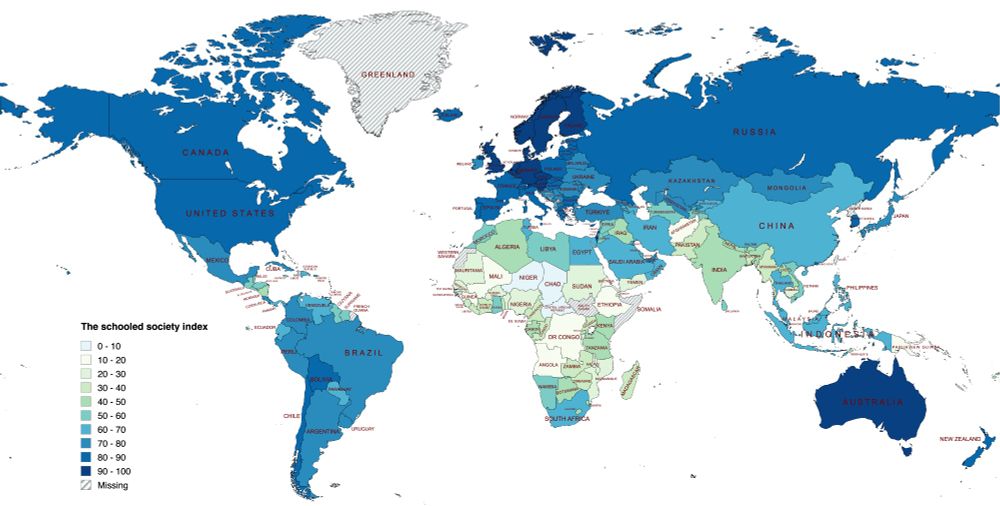
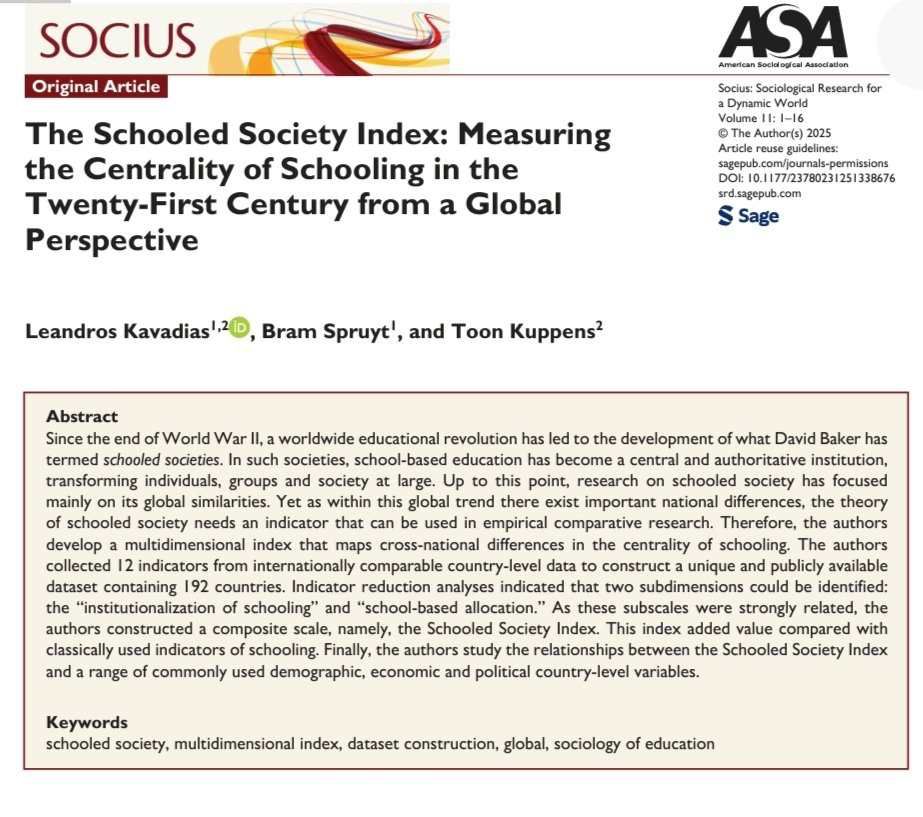
New paper 🏫!
We present the Schooled Society Index: a multidimensional indicator that maps cross-national differences in the centrality of schooling on a global scale. Written with
@bramspruyt.bsky.social and @tkupp.bsky.social
doi.org/10.1177/2378...
Data is publicly available: osf.io/49xy5/
16.05.2025 08:04 — 👍 10 🔁 3 💬 0 📌 1
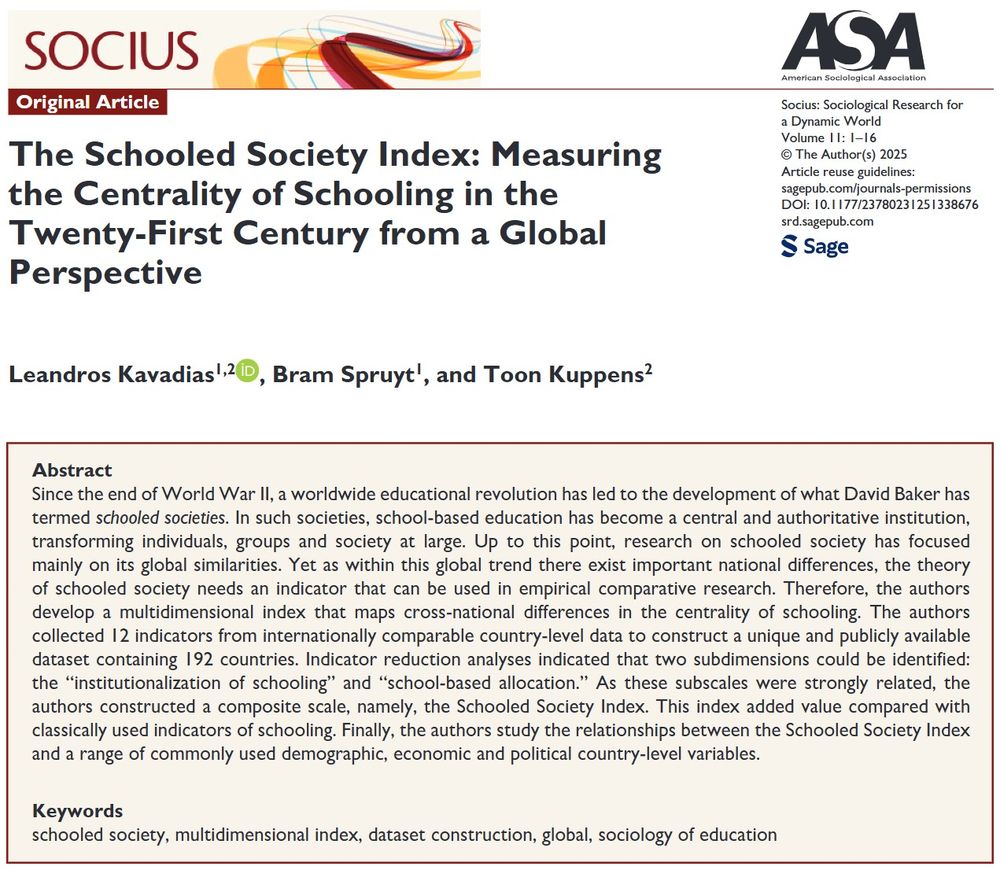
🏫 How central is schooling in your country?
In their new #Socius study, Drs. Kavadias, @bramspruyt.bsky.social & @tkupp.bsky.social introduce the Schooled Society Index—a global measure of how #education acts as a force of #institutionalization and #stratification.
Read: doi.org/10.1177/2378...
15.05.2025 19:31 — 👍 14 🔁 7 💬 1 📌 0

Elitisme even bedreigend als populisme
Bij ‘racisme’ of ‘seksisme’ worden mensen beoordeeld op huidskleur of gender en als gevolg daarvan anders en minderwaardig gevonden. Maar er is ook iets...
𝐈𝐬 𝐞𝐥𝐢𝐭𝐢𝐬𝐦𝐞 𝐞𝐯𝐞𝐧 𝐛𝐞𝐝𝐫𝐞𝐢𝐠𝐞𝐧𝐝 𝐚𝐥𝐬 𝐩𝐨𝐩𝐮𝐥𝐢𝐬𝐦𝐞? 🤔
Hoogopgeleiden die neerkijken op laagopgeleiden: een helaas veel voorkomend fenomeen dat educationisme heet.
Volgens @tkupp.bsky.social “is het schadelijk voor de betrokkenen en voor de samenleving als geheel”
Lees hier het artikel 👉🏻 bit.ly/3GxLL3t
29.04.2025 09:54 — 👍 3 🔁 2 💬 0 📌 0
Er is een verschil tussen (1) streven naar succes en beter willen doen dan anderen en (2) neerkijken op mensen die het niet geprobeerd of gehaald hebben omdat ze niet ‘smart’ genoeg zijn. Mijn kritiek is op (2)
13.03.2025 15:42 — 👍 1 🔁 0 💬 0 📌 0
Wat mij eraan stoort is dat ‘the ordinary’ pejoratief klinkt, en ik vind een negatieve houding tegenover mensen met een ander diploma problematisch. Je kiest een master om verder te komen, maar waarom wil je slimmer voelen dan iemand anders?
13.03.2025 14:47 — 👍 1 🔁 0 💬 2 📌 0
Mijn eigen universiteit gaat met de slogan ‘Outsmart the ordinary’ masterstudenten werven. Dat is jammer. Het lijkt me toch een voorbeeld van het superioriteitsgevoel bij hoogopgeleiden
12.03.2025 08:45 — 👍 5 🔁 1 💬 3 📌 1
Erg goede reactie op de claim (van oa @schimmelpenninck.bsky.social ) dat er geen biases/vooroordelen zouden zijn op basis van oploeidingsniveau… die zijn er wel degelijk
12.03.2025 06:52 — 👍 2 🔁 2 💬 0 📌 0
High status people as compared to low status people, that is.
14.02.2025 15:35 — 👍 0 🔁 0 💬 0 📌 0
High-status people who do not believe society is meritocratic appear to be concerned about inequality but do not support measures to reduce inequality
14.02.2025 15:32 — 👍 0 🔁 0 💬 1 📌 0
Gutted that my suggested title “if you’re reading this you are probably a hypocrite“ was voted down by my co-authors. Despite this disappointment I am happy with yet another nice paper by @jochemvannoord.eu
14.02.2025 15:30 — 👍 6 🔁 0 💬 1 📌 0
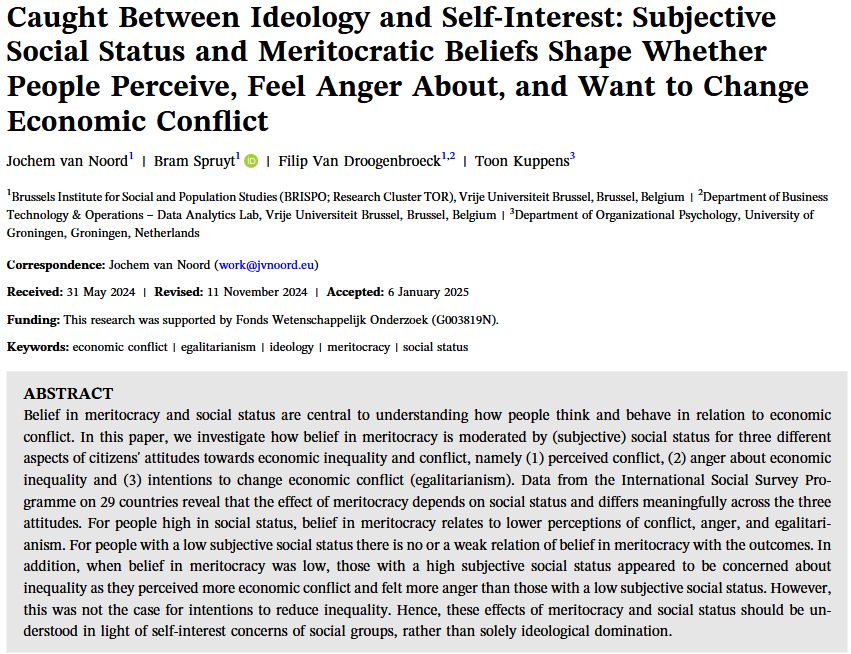
Title page of "Caught Between Ideology and Self‐Interest: Subjective
Social Status and Meritocratic Beliefs Shape Whether
People Perceive, Feel Anger About, and Want to Change
Economic Conflict"
Abstract: "Belief in meritocracy and social status are central to understanding how people think and behave in relation to economic conflict. In this paper, we investigate how belief in meritocracy is moderated by (subjective) social status for three different aspects of citizens' attitudes towards economic inequality and conflict, namely (1) perceived conflict, (2) anger about economic inequality and (3) intentions to change economic conflict (egalitarianism). Data from the International Social Survey Programme on 29 countries reveal that the effect of meritocracy depends on social status and differs meaningfully across the three attitudes. For people high in social status, belief in meritocracy relates to lower perceptions of conflict, anger, and egalitarianism. For people with a low subjective social status there is no or a weak relation of belief in meritocracy with the outcomes. In addition, when belief in meritocracy was low, those with a high subjective social status appeared to be concerned about inequality as they perceived more economic conflict and felt more anger than those with a low subjective social status. However, this was not the case for intentions to reduce inequality. Hence, these effects of meritocracy and social status should be understood in light of self-interest concerns of social groups, rather than solely ideological domination."
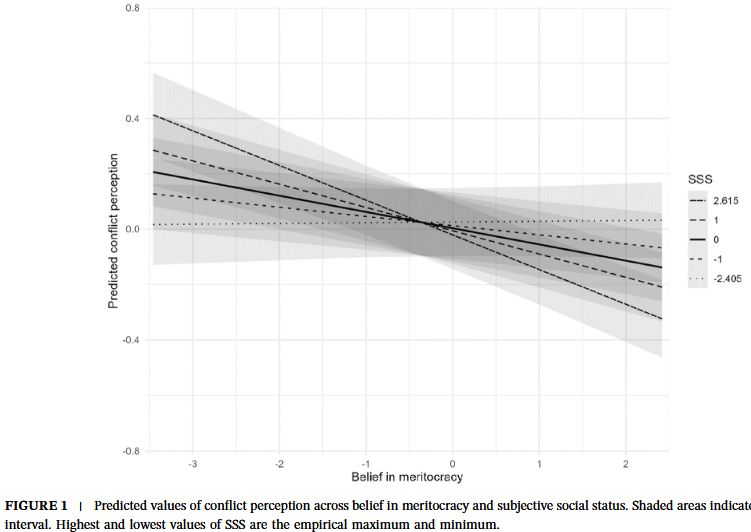
Figure 1: Predicted values of conflict perception across belief in meritocracy and subjective social status.
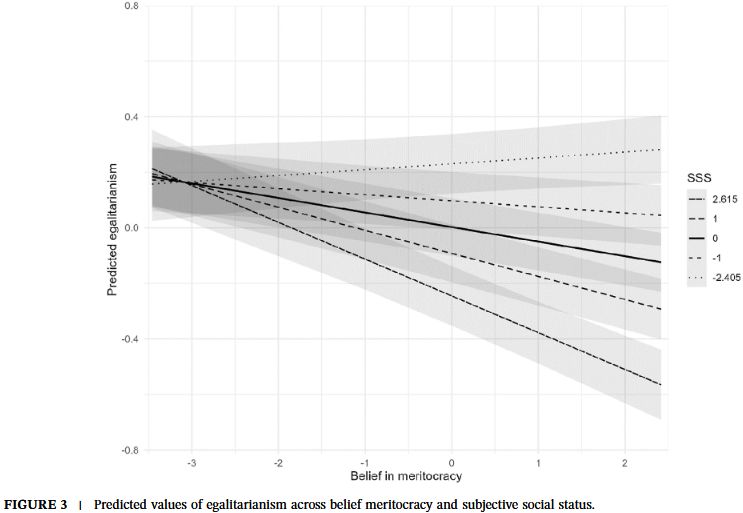
Figure 3: Predicted values of egalitarianism across belief meritocracy and subjective social status.
🏁New paper! Social status moderates the effect of belief in meritocracy on economic conflict attitudes. Meritocracy doesn't always legitimize inequality and sometimes it does more :)
Published with @bramspruyt.bsky.social Filip Van Droogenbroeck and @tkupp.bsky.social
doi.org/10.1111/1468...
07.02.2025 12:31 — 👍 21 🔁 11 💬 1 📌 1











